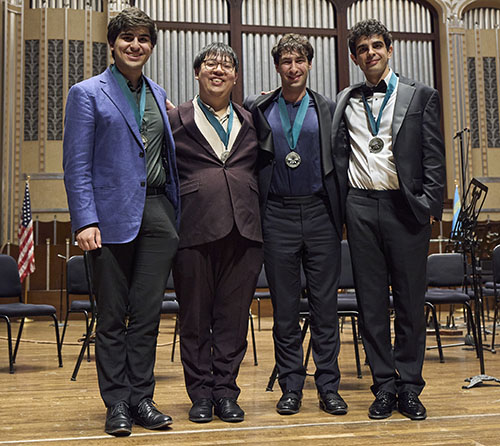by Daniel Hathaway
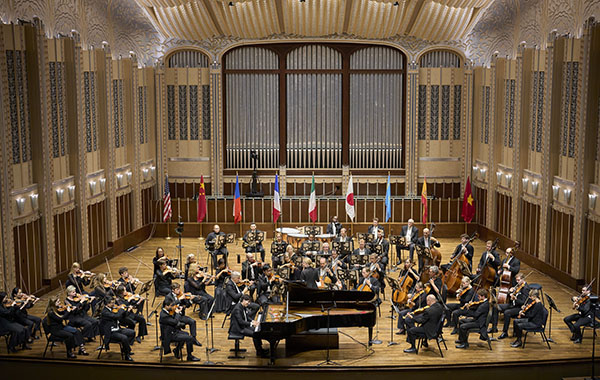
It only remained to be revealed which of the generous cash prizes (ranging from $75,000 to $10,000) they would take home.
Given the quality of the competitors’ playing to this point, the jury had some tough choices to make.
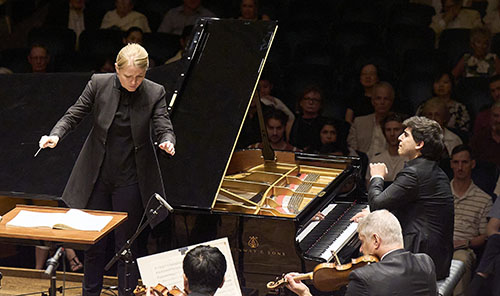
For competition purposes, Ozel might have chosen a flashier piece than Beethoven’s fourth, but his elegant reading of this intimate and emotionally complex concerto revealed his excellent taste and intellectual curiosity
The work is a conversation between piano and orchestra rather than a struggle for domination, and from the perfectly voiced, sensitive opening clear through to the witty finale, Ozel played with a luxurious sound, and an expansive color palette and dynamic range. Always keeping in close contact, Reinhardt and the Orchestra responded with beautiful long, relaxed lines. Fine wind solos and other magical details ensued as Ozel’s shapely phrases and nuances were matched by his fellow instrumentalists.
When the conversation became heated in the second movement recitative, Ozel and the orchestra switched roles dramatically, then the pianist made a delightful transition into the third movement rondo. From that point on to the end, there was nothing for the listener to do but sit back and enjoy Ozel’s response to Beethoven’s genius in manipulating musical material.
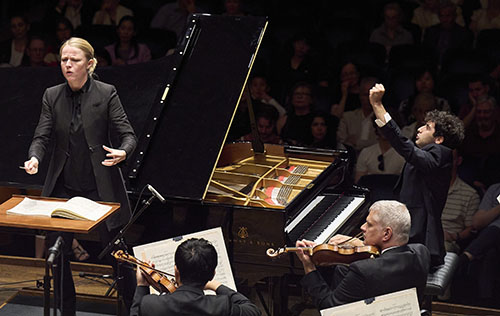
Richard Weiss opened the third movement with a beautifully lush cello solo, inspiring Lando to explore more of his sensitive side, but in the fourth movement finale, the pianist pumped up volume and intensity as often as possible, even stomping his foot on the stage floor during big attacks (and indulging himself in a few too many theatrical releases that nearly took him off the bench).
Reinhardt wisely kept things under control, never allowing Lando to get too far ahead of himself. It will be fun to watch this young pianist as his career develops.
Rachmaninoff reigned on Saturday, with performances of his second and third concertos by Giuseppe Guarrera (32, Italy) and Zijian Wei (25, China). It’s worth noting here that the CIPC management took some pains to prevent duplication of concertos in the final round, for which audiences and Orchestra were probably grateful, if not so much the jury.
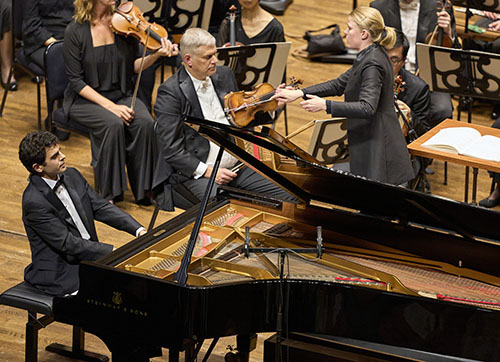
On the podium, Ruth Reinhardt was a splendid collaborator who drew countless details and nuances from The Cleveland Orchestra after only a tête-à-tête with the soloist and a one-hour rehearsal.
The second movement was graced by a beautiful opening and a clarinet solo from Afendi Yusuf, and relaxed lyrical lines from Guerrera, who perfectly outlined the Orchestra’s melodic lines with finely-voiced chords and provided an expansive cadenza.
The finale was brisk but nicely paced, and the sound was magnificent. Reinhardt did a formidable job of holding everything together.
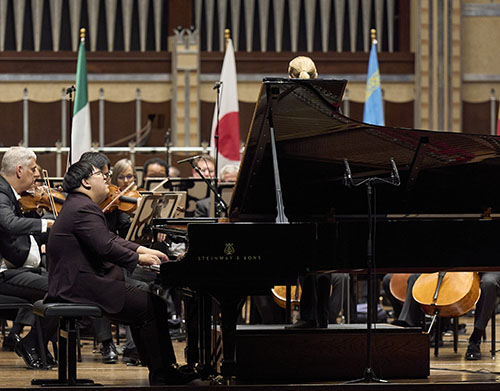
The Intermezzo was well-paced, with plenty of room to breathe and grow, the waltz section ear-catching.
Soloist and Orchestra made a fine transition into the Finale, and once there, all of Wei’s clean piano lines had purpose and direction. The Orchestra simply sounded spectacular, and Wei not only communicated with his musical colleagues, but with the audience as well, putting the finishing touches on a brilliant performance.
He also got a laugh near the end when an ill-fated upward gesture sent his eyeglasses flying. A nearby violinist returned them after the performance.
After a final jury seance, rankings for the 2024 competition were announced: Fourth Prize went to Giuseppe Guarrera, Third Prize to Maxim Lando, Second Prize to Evren Ozel, and First Prize to Zijian Wei.
These special prizes were awarded as well:
Baroque Prize: Evren Ozel
Beethoven Prize: Giuseppe Guarrera
Cairns Family American Prize: Jonathan Mamora
ChamberFest Cleveland Prize: Zijian Wei
Chopin Prize: Antonio Chen Guang
Concerto Round Audience Prize: Zijian Wei
Female Composer Prize Zhu Wang
Henle Verlag Urtext Prize: Zijian Wei
Junior Jury Prize: Zijian Wei
Mozart Prize: Zihao Wu
Playoff Audience Prize Maxim Lando & Zhu Wang
Tomorrow we interview each of the four finalists.
Photos © Roger Mastroianni, courtesy of The Cleveland Orchestra.
Published on ClevelandClassical.com August 19, 2024.
Click here for a printable copy of this article
Return to the Front Page.




